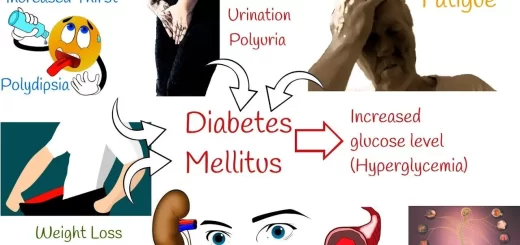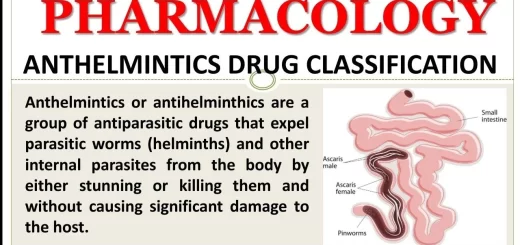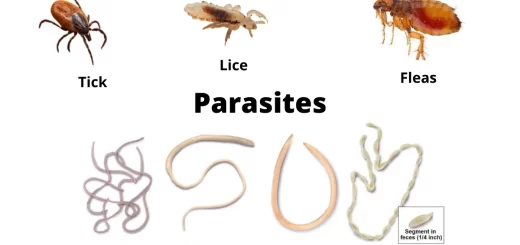Cortisol effects, Cause of melanin deposition, Adrenal androgens and Adrenogenital Syndrome
Cortisol is a steroid hormone, It regulates a wide range of processes throughout the body, including metabolism and the immune response, It has a very important role in helping the body respond to stress, It participates in many homeostatic maintenance actions such as blood pressure; immune system; metabolism of protein, carbohydrate, and adipose; and anti-inflammatory action.
Regulation of cortisol secretion
1. Hypothalamic regulation
It secretes corticotropin-releasing factor (CRF) which acts on the anterior pituitary to increase secretion of ACTH.
2. Pituitary regulation
The anterior pituitary gland secretes ACTH. It is a large polypeptide controlled by the hypothalamic corticotrophin-releasing factor (CRF). ACTH causes the formation of adrenocortical hormones. Long-term stimulation of the adrenal cortex by ACTH causes hypertrophy and proliferation of the adrenocortical cells, especially in the zona fasciculata and reticularis where excess cortisol and androgens are secreted.
When ACTH is secreted by the anterior pituitary gland, several other hormones that have similar chemical structures are secreted simultaneously as melanocyte-stimulating hormone (MSH), lipotropin, and endorphin. Under normal conditions, none of these is known to be secreted in enough quantities to have a significant effect on the body, but this may not be true when the rate of secretion of ACTH is very high. MSH causes the melanocyte to form melanin pigments. ACTH is similar to MSH. It has a melanocyte-stimulating effect as MSH.
3. Negative feedback mechanism
Cortisol has direct negative feedback effects on the hypothalamus to decrease the formation of CRF and the anterior pituitary gland to decrease the formation of ACTH.
4. The effect of physiological stress on ACTH secretion
Physical or mental stress can lead within minutes to increase secretion of cortisol. Stimulus caused by the stress is first transmitted upward to the hypothalamus and from there to the anterior pituitary where ACTH is secreted. Within minutes, large quantities of glucocorticoids are present in the blood.
5. Circadian rhythm of glucocorticoid secretion
Cortisol is high in the early morning (between 6-8 a.m), but low in the late evening This effect results from a 24-hour cyclic alteration in the signals from the hypothalamus that case cortisol secretion.
Effects of hypersecretion of glucocorticoids
- Mobilization of fat from the lower part of the body, with extra-deposition of fat in the thoracic & upper abdominal regions giving rise to a so-called “buffalo” torso and rounded face.
- Excess secretion of steroids leads to an edematous appearance of face “moon face”.
- Androgenic potency of some of the hormones sometimes causes acne & hirsutism (excess growth of facial hair).
- 80% of the patients have hypertension, presumably because of the slight mineralocorticoid effects of cortisol.
- Increased blood glucose concentration leads to adrenal diabetes resulting from increased gluconeogenesis. If this “adrenal diabetes” lasts for many months, the beta cells in the islets of Langerhans occasionally “burnt out” because the high blood glucose greatly overstimulates them to secrete insulin. The destruction of these cells then causes frank diabetes mellitus, which is permanent for the remainder of life.
- Decreased tissue proteins almost everywhere in the body with the exceptions of the liver and the plasma proteins, Loss of protein from the muscles causes loss of muscle mass and severe weakness.
- The loss of protein synthesis in the lymphoid tissues leads to a suppressed immune system so that many of these patients die from infections.
- Collagen fibers in the subcutaneous tissue are diminished so that the subcutaneous tissues tear easily, resulting in the development of large purplish striae where the subcutaneous tissues have torn apart.
- Lack of deposition in the bones causes osteoporosis with consequent weakness of the bones.
- Mental changes as euphoria. This condition is known as Cushing syndrome.
Effects of hyposecretion of glucocorticoids
- A loss of cortisol secretion makes it impossible for the person with Addison’s disease to maintain normal blood glucose concentration between meals because he can’t synthesize significant quantities of glucose by gluconeogenesis.
- A lack of cortisol reduces the mobilization of both proteins and fats from the tissues, thereby depressing many other metabolic functions of the body, When excess quantities of glucose and other nutrients are available, the person’s muscles are still weak, indicating that glucocorticoids are also needed to maintain other metabolic functions of the tissues besides simply energy metabolism.
- Anemia.
- The person with Addison’s disease is highly susceptible to the deteriorating effects of different types of stress, and even a mild respiratory infection can sometimes cause death.
- Melanin pigmentation of the mucous membranes and skin, which is deposited in blotches and especially in thin skin areas, such as the mucous membranes of the lips and the thin skin of the nipples.
Cause of melanin deposition
When cortisol secretion is depressed the normal negative feedback to the hypothalamus and anterior pituitary is also depressed, so allowing increased rates of ACTH secretion as well as simultaneous increase amounts of melanocyte-stimulating hormone (MSH).
Probably, the tremendous amounts of ACTH cause most of the pigmenting effect because these can stimulate the formation of melanin by the melanocyte in the same way that MSH does. This condition is known as Addison’s disease. It is usually associated with mineralocorticoids deficiency.
Adrenal androgens
Adrenal androgens are continually secreted by the adrenal cortex, especially during fetal life. Also, progesterone and estrogens which are female sex hormones are secreted in very minute quantities, Part of the early development of the male sex organs results from childhood secretion of adrenal androgens.
Androgens exert masculinizing effects, they promote protein anabolism and growth, The adrenal androgens also exert mild effects in the female, not only before puberty, but also throughout life, Much of the growth of the pubic and axillary hair in the female probably results from the action of these hormones.
Some of the adrenal androgens are converted to testosterone, (the major male sex hormone) in the extra-adrenal tissues, which probably accounts for much of their androgenic activity, Secretion of the adrenal androgens is controlled by ACTH.
Effects of hypersecretion of adrenal androgens (Adrenogenital Syndrome)
The adrenocortical tumor secretes excessive quantities of androgens that cause intense masculinizing effects throughout the body, In the female, she develops virile characteristics (virilism) including the growth of a beard, a much deeper voice, masculine distribution of hair on the body and on the pubis, growth of the clitoris to resemble a penis, and deposition of proteins in the skin and especially in the muscles to give typical masculine characteristics.
In prepubertal boys, a virilizing adrenal tumor causes the same characteristics as in the female, plus rapid development of the male sexual organs and creation of male sexual desire, In an adult male, the virilizing characteristics of the adrenogenital syndrome are usually completely obscured by the normal virilizing characteristics of the testosterone secreted by the testes, Therefore, it is often difficult to make a diagnosis of adrenogenital syndrome in male adults.
Histology of pancreas, Structure of islets of Langerhans, Insulin function & Metabolism
Glucocorticoid (cortisol) function, Effects of cortisol on skeletal muscle & circulatory system
Suprarenal (adrenal) cortex hormones, structure, function & location
Calcium metabolism, Calcitonin function, Vitamin D3 & Biosynthesis of calcitriol
Parathyroid gland anatomy, structure, function, hormones & Tetany types
Endocrine system structure, function, disorders, Endocrine Glands & Hormones types



